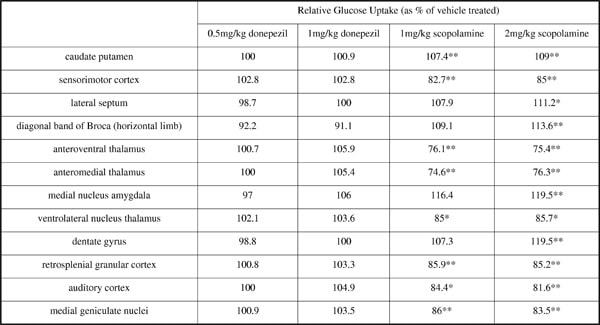The central cholinergic system has been implicated in cognitive function. Pre-clinical research has shown that the anticholinesterase, donepezil, can improve rodent performance in behavioural tasks of learning and memory, reverse behavioural deficits associated with administration of muscarinic antagonists and increase extracellular acetylcholine levels in the cerebral cortex. Furthermore, the muscarinic antagonist scopolamine has been widely reported to impair performance in a variety of rodent tests of learning and memory. In order to investigate the effects of scopolamine and donepezil on glucose utilisation, two studies were carried out using semi-quantitative 14C-2-deoxyglucose autoradiography on male Hooded Lister rats following scopolamine (1mg/kg & 2mg/kg i.p. or vehicle) or donepezil (0.1mg/kg, 0.5mg/kg & 1mg/kg i.p. or vehicle) treatment. The relative glucose uptake values were calculated for discrete brain regions and analysed by one-way ANOVA; if significant post-hoc Dunnett’s tests were performed (*p<0.05; **p<0.01). The relative glucose uptake values for selected brain regions are summarised in table 1 below, with mean glucose uptake for each treatment expressed as a percentage of the mean glucose uptake of the vehicle treatment groups for comparison. These findings were in accordance with previously published studies of scopolamine-mediated alteration in glucose utilisation using the fully quantitative 2-deoxyglucose method (e.g., Helen & London, 1984). Donepezil, however, induced no significant changes in glucose uptake in any brain region. It is therefore likely that no changes will be detected in response to donepezil without a challenge to the cholinergic system through pharmacological manipulation or lesioning. However, it is possible that cognitive enhancing muscarinic agonists that act directly on the receptors could produce significant alteration in glucose utilisation.
Life Sciences 2007 (2007) Proc Life Sciences, PC400
Poster Communications: Mapping alterations in regional brain activity by 2-deoxyglucose imaging following pharmacological manipulation of cholinergic neurotransmission
L. H. Forsyth1, S. M. Cochran1, R. R. Brett1
1. Strathclyde Institute of Pharmacy & Biomedical Sciences, University of Strathclyde, Glasgow, United Kingdom.
View other abstracts by:
Table 1
Where applicable, experiments conform with Society ethical requirements.

